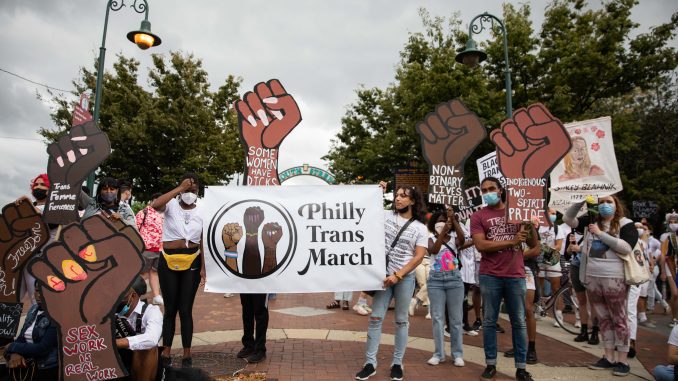
Hundreds of people gathered at Washington Square Park on Saturday for the 11th annual Philly Trans March to demand justice, liberation and equality for the transgender and non-binary community, with a focus on transgender people of color.
“I tend to bring the native perspective to the march along with other natives in town,” said Janis Stacy, one of the organizers for Philly Trans March. “But we still want to focus a lot of what the movement is on the Black and Brown people, much darker skin than myself. Because they get treated so badly.”
The march was important for communicating the message that discrimination against trans people must end and that people should work to understand the challenges they face, said Bri Golphin, one of the organizers of the march.
Attendees began marching at Washington Square Park and then made their way to South Street before returning to the park. Before and during the march, several trans and non-binary speakers in attendance told their stories and demanded change for those disproportionately affected by discrimination, violence and harassment.
There have been 38 transgender or gender non-comforming people fatally shot or killed by other violent means in 2021, according to the Human Rights Campaign, an organization that advocates for the rights of LGBTQ+ people.
One of the speakers, Valentina Rosario, the trans equity project coordinator at Galaei, a Queer and Trans, Black, Indigenous and People of Color social justice organization, discussed issues like reproduction rights, voter rights, mass incarceration and immigration rights that marginalized communities, and especially the trans community, are facing.
“Today is more than a march,” Rosario said. “It is an action, an action of taking, an action of celebrating and uplifting the ancestors. We need to fight and continue moving the needle in the right direction. All of these issues disproportionately affect Black and Brown, Latinx trans folks.”
For some, it was their first time attending the march as an openly trans person. Teddie Kelly, a member of Workers World Party, an organization fighting for a socialist society, could not have gone through her transition as easily without the trans community and movement for transgender rights, she said.
“It has made my personal transition so incredibly easy, because there are so many great people in the movement, there’s people who understand already, they know the nature of gender oppression, they know the struggle,” said Kelly.
Jackson Burke, a junior ceramics major and president of Students for Trans Awareness and Rights at Temple University, came to the march to show solidarity for the trans community, he said.
“It means community and empowerment, really,” Burke said. ”Supporting other members of my community and always standing up for members of my community, always showing up for them, being there for them.”




















Be the first to comment